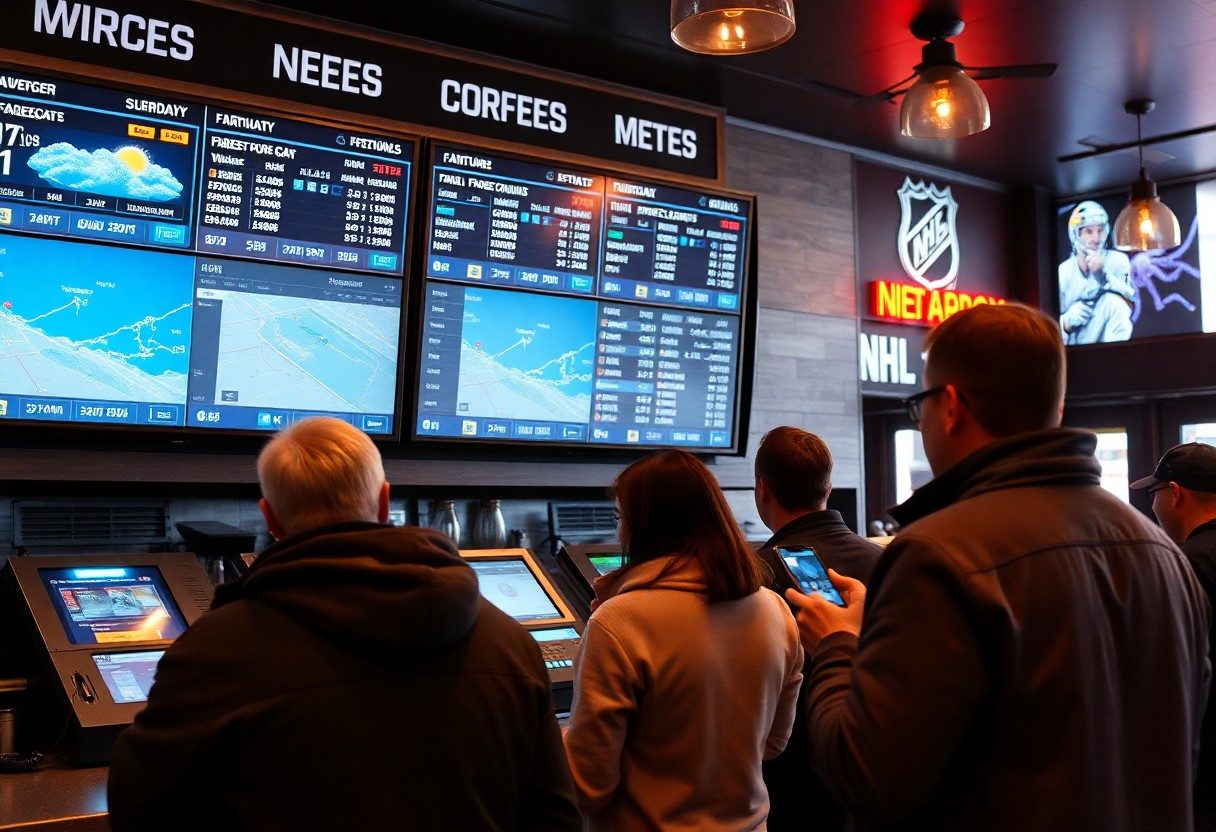Just like any sport, NHL betting outcomes are influenced by various factors that can tip the scales in favor of one team over another. Weather conditions in certain cities can impact player performance, while travel fatigue from long road trips may hinder a team’s energy levels. Additionally, game scheduling can create mismatches, particularly when one team has rest advantages. Understanding these elements is crucial for anyone looking to make informed betting decisions in the NHL landscape.
Understanding NHL Betting Dynamics
NHL betting dynamics encompass a multitude of elements that contribute to predicting outcomes. Successful bettors assess not only team performance and player statistics but also the impact of external factors like weather and travel. Recognizing these dynamics enhances betting strategies and allows for more informed decisions.
Key Factors in NHL Betting
Several key factors significantly influence NHL betting outcomes, including:
- Team Form: A team’s recent performance relative to their historical data.
- Injuries: Player absences can shift betting lines and expectations.
- Goaltending: A strong goalie can be the decisive factor in a match.
- Home Ice Advantage: Teams often perform better at home due to familiar conditions.
Thou must analyze these elements diligently to enhance your betting predictions.
The Importance of Team Performance
Team performance serves as the bedrock for NHL betting decisions. Looking at metrics like winning streaks, goal differential, and head-to-head matchups provides insight into a team’s current form. For example, teams on a winning streak often gain momentum, while those in a slump tend to struggle under pressure. Analyzing advanced metrics such as Corsi and Fenwick can further illustrate a team’s underlying performance trends, impacting betting lines significantly. Such analyses become critical as the season progresses, where every game might be a pivotal point for playoff positioning or player confidence.
The Impact of Weather Conditions
Weather conditions are often overlooked in NHL betting, yet they can significantly sway game results. Factors like temperature, precipitation, and wind speed can affect player performance and team dynamics, making it vital to consider forecasts prior to placing bets. For example, extreme cold can lead to slower skates and reduced scoring opportunities, while heavy snow or rain impacting travel schedules can lead to player fatigue or altered game strategies. Understanding these elements adds an important layer to analyzing potential outcomes.
How Weather Influences Game Outcomes
Weather directly affects gameplay, influencing strategies and player endurance. Cold temperatures can stiffen players’ muscles while damp conditions can make pucks more difficult to control. For instance, teams accustomed to high-altitude play may struggle in humid or warmer climates. Games played in poor weather conditions often result in lower scoring, as teams may opt for more conservative play to avoid mistakes.
Weather’s Role in Betting Strategies
Successful betting requires integrating weather forecasts into analysis. Bettors who monitor expected conditions gain an edge by anticipating game flow changes. For instance, teams facing adverse weather may see an uptick in unders, as defense becomes paramount. By analyzing how teams have performed in similar conditions historically, bettors can better predict outcomes and find value in betting lines.
Weather’s influence on betting strategies extends beyond immediate game predictions. Historical data reveals that certain teams excel under specific weather conditions, which can inform future bets. For example, in frigid temperatures, teams with deeper rosters may thrive, as their bench strength becomes imperative. Additionally, analyzing past performance in adverse conditions enables bettors to identify profitable patterns. By capitalizing on trends related to weather impacts, savvy bettors can make more informed decisions, increasing their chances of success over the long term.
Travel Considerations for Teams
Travel dynamics play a significant role in player performance and overall team success in the NHL. Long-distance travel, particularly during back-to-back games, can lead to fatigue, disrupting players’ schedules and routines. Time zone changes also impact circadian rhythms, affecting athletes’ sleep patterns and focus. Accurate assessment of travel conditions, including flight times and potential delays, is vital for coaches and bettors alike to fully understand the implications of travel on team performance.
Effects of Travel on Player Performance
Extended travel often results in decreased energy levels among players, directly affecting their performance on the ice. Studies indicate that teams with frequent travel tend to exhibit a decline in shooting accuracy and overall defensive efficiency. A weary team facing an opponent with fewer travel demands may struggle to maintain competitive intensity, which is vital for securing wins.
Home vs. Away Games: Analyzing Trends
Home games generally grant a distinct advantage due to the familiar surroundings and supportive crowds. Statistics reveal that teams typically win approximately 60% of their home games, benefiting from reduced travel fatigue and the comfort of established routines. Conversely, away games can expose teams to increased pressure and unfamiliar ice, which often leads to lower performance levels.
Analyzing the balance between home and away games offers valuable insight into betting strategies. For instance, while some teams consistently dominate at home, their away performance may vary dramatically, signaling betting opportunities. Additionally, examining travel schedules in combination with a team’s offensive or defensive strength can highlight potential pitfalls or advantages. For example, a team coming off a long road trip may struggle against a well-rested opponent, particularly in the third period, making these trends crucial for bettors aiming to capitalize on misassumptions surrounding team performance based on location.
Scheduling Challenges in the NHL
Scheduling unpredictability in the NHL can significantly impact game outcomes. Teams may face a grueling stretch of games that tests their endurance, while others might catch advantageous breaks. A compact schedule can lead to fatigue, influencing player performance, strategies, and ultimately, betting odds. Additionally, travel schedules can add to these complications, affecting a team’s ability to perform consistently over a season.
Back-to-Back Games and Their Impact
Back-to-back games pose a significant challenge for NHL teams, often resulting in decreased performance due to fatigue and strain. Players may not recover fully from a prior night’s contest, leading to lethargy and mistakes. Analyses show that teams playing back-to-back games have a lower winning percentage, impacting betting strategies. Bettors should consider prior game intensity and travel when evaluating teams in these situations.
The Role of Rest in Team Performance
Adequate rest is directly linked to a team’s performance in the NHL. Teams that enjoy extended breaks between games often display improved focus, energy, and overall effectiveness on the ice. For instance, teams coming off four or more days of rest typically demonstrate a higher win rate compared to those playing every other night. Statistics indicate that enough time to recuperate can lead to a stunning 10-15% improvement in a team’s point production, translating directly into more favorable betting outcomes.
Combining Factors for Betting Success
Successful NHL betting requires integrating multiple variables that can significantly impact game outcomes. By understanding how weather, travel, and scheduling intersect, bettors can make informed decisions. Key considerations include:
- Analyze home advantage vs. away performance
- Assess team fatigue linked to travel schedules
- Monitor weather conditions affecting player performance
- Consider recent match-ups and trends
Assume that leveraging these combined insights can lead to enhanced betting accuracy.
Data Analysis and Predictive Modeling
Implementing statistical analysis can uncover trends and inform betting strategies. By examining historical data, including team performance under specific weather conditions, patterns emerge that inform predictive modeling techniques. Machine learning approaches may provide deeper insights into potential outcomes based on a multitude of variables, enhancing decision-making accuracy.
Adapting Strategies Based on Current Conditions
Adjusting betting strategies in real-time is key to capitalizing on changing conditions. Monitoring factors like injuries, transaction activity, and weather updates can shift the dynamic of a matchup. For example, if extreme weather is forecasted, teams accustomed to indoor play might struggle more, influencing betting odds and outcomes.
Expanding on adapting strategies involves continuously tracking live game conditions. Bettors should remain agile, reevaluating their positions as new information arises. An unexpected injury to a star player or a shift in scheduling due to inclement weather can greatly alter a team’s dynamics. Being receptive and ready to pivot can maximize return potential in NHL betting.
Responsible Betting Practices
Responsible betting practices play a vital role in maintaining a healthy relationship with wagering activities. Understanding personal limits and using strategic approaches can help mitigate risks associated with NHL betting. By prioritizing informed decisions and disciplined actions, bettors can enhance their overall experience while minimizing negative consequences.
Managing Risks with Informed Decisions
Evaluating statistics, player performances, and team dynamics before placing a bet can greatly reduce risks. For instance, analyzing head-to-head matchups and recent game trends empowers bettors to make educated choices. Pairing this analysis with reputable sources enhances the reliability of betting strategies.
Setting Limits and Staying Disciplined
Establishing predefined limits on spending and bets is fundamental for sustainable betting practices. Sticking to a budget shields against impulsive decisions and potential financial strain. Employing a staking plan can ensure discipline, allowing bettors to track their performance effectively.
Setting limits involves more than just financial boundaries; it encompasses emotional control and long-term planning. Bettors should define both monetary and time limits, acknowledging the risks of chasing losses or excessive wagering following a win. By implementing a strict betting schedule and maintaining a log of all bets, it becomes easier to adhere to established limits while observing trends that could indicate the need for a pause or reassessment. A disciplined approach not only safeguards finances but also fosters a more enjoyable and responsible betting atmosphere.
Final Words
On the whole, weather conditions, travel schedules, and game timings significantly influence NHL betting outcomes. Adverse weather can impact player performance and team momentum, while travel fatigue can hinder a team’s competitiveness, especially on long trips. Additionally, game scheduling may affect rest periods, influencing team dynamics and strategies. Bettors must consider these factors for informed wagering decisions, improving their chances of success in NHL betting markets.
FAQ
Q: How does weather impact NHL betting outcomes?
A: Weather can influence player performance, ice conditions, and travel logistics. Poor weather may hinder travel, leading to delays or changes in team rosters. Additionally, extreme temperatures can affect skaters’ stamina and focus, impacting game dynamics and betting odds.
Q: In what ways does travel schedule affect NHL teams?
A: Travel schedules play a significant role in player fatigue and acclimatization. Teams that face back-to-back games or long-distance travel may experience reduced performance. Bettors should assess the team’s travel history and fatigue levels to inform their bets on game outcomes.
Q: How does scheduling affect player availability and team strategy in NHL betting?
A: Game schedules can affect player injuries, suspensions, and rest days. A packed schedule might force teams to rotate players, impacting the overall team strategy. Bettors should analyze the lineup changes and coaching adjustments that may occur due to the scheduling to better predict outcomes.












